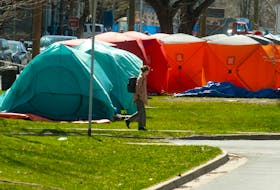With active COVID-19 cases diminishing in Nova Scotia, some people are looking forward to returning to their pre-COVID daily routines.
For others, going back to work or stepping outside for long periods of time may be causing anxiety.
One reason for this anxiety is that people don’t like change.
“Anxiety and fear come from change and uncertainty,” says Minzhou Sun, who is a registered professional counsellor with the Canadian Professional Counsellor Association.
Workplaces won’t look the same after COVID-19 and it’s not just about the extra tissue box or hand sanitizer.
As part of the provincial government’s guidelines to keep workspaces safe, employees going back to work can expect some changes to their regular routines.
Changes include cleaning and disinfecting areas at least twice a day and design adjustments that increase spatial separation and limit where people gather. The guidelines also include administrative controls, such as revising work schedules to reduce the number of employees working at a given shift.
All these changes can be difficult for people to get used to. People with a pre-existing anxiety disorder or depression are at a higher risk of declining mental health during these times.
“Because everything is different you have to constantly think about every detail,” Sun says. “You’ll feel tired because of it. When these frustrations accumulate people will get (angry) and more negative.”
While people have the tendency to “suck it up and do it,” Sun says adaptation will happen one step at a time.
Until then, she says it’s okay get frustrated. When that happens, people should take a step back, acknowledge their feelings and allow them to pass.
Taking five-minute breaks between tasks can also help people deal with major changes in their routines.
“Breaks can be stretching, having a snack, listening to music or even doing nothing,” she says. “It’s going to help you restore energy and keep you relaxed.”
She adds that it’s important to embrace change and learn to give up control, because we won’t be going back to pre-COVID-19 normal for at least a few years.
Another reason people may be anxious about going back to work is their fear of getting the virus. But Sun says fear can be a good thing.
“The purpose of fear is to keep you away from danger,” she says. “If you freak out of the feeling of fear, you will go nowhere, but understand how this feeling is trying to protect you and you will logically protect yourself.”
Sun says people should foster fear into action by following public health regulations, such as handwashing for the recommended time and wearing a mask. But they should also realize there’s only so much they can do.
“No matter how much you prepare, things will always happen that are out of your control.”
People not following regulations are also causing anxiety for others. For example, Sun says her clients who are Chinese immigrants are anxious because they see people going out without wearing masks.
“We don’t want people to get ill. We hope everyone will protect themselves.”
People of East Asian descent were used to wearing masks before COVID-19.
Since the start of the COVID-19 outbreak in Nova Scotia, Sun has facilitated COVID-19 crisis intervention webinars both for the Chinese community and for Canadians from different backgrounds through Fusion Halifax. In part of the webinar, Sun explains the factors that influence how people in East Asia perceive masks differently compared to people in Canada.
Sun says that’s part of the culture in the region. The large population per capita and crowded streets and public transportation makes it difficult to maintain personal space.
“Particularly during the flu season, if you are sick and you work in a crowded small office, would you wear a mask to protect yourself? Most people would say yes.”
People wear masks not only to protect themselves from disease. Whether you are sick or healthy, wearing a mask is the only way to keep people from literally breathing against your face.
“That’s a story I have to explain to everyone. Because I think people are mad at each other. That’s not necessary.”
Nebal Snan is a local journalism initiative reporter, a position funded by the federal government.









